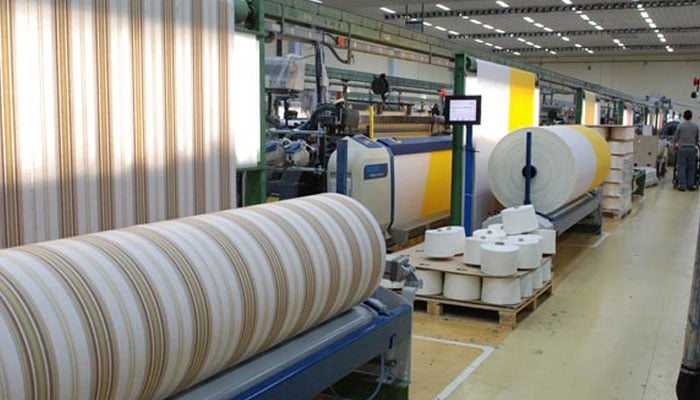Textile exports remain flat at $5.5 billion in five months
KARACHI: Textile exports remained flat at $5.506 billion during the first five months of the current fiscal year of 2018/19 as the value-added sector couldn’t perform up to the mark despite constant rupee devaluation against the US dollar.
Pakistan Bureau of Statistics (PBS) data on Monday showed that knitwear was the only product in the textile sector that saw a double-digit growth in exports in the July-November period.
Knitwear exports increased 10.58 percent to $1.214 billion in the first five months over the corresponding period a year earlier.
Exports of readymade garments inched up 0.3 percent to $1.022 billion in the first five months of the current fiscal year. Bedwear exports were up around two percent to $966.007 million during the period under review.
Ehsan Malik, chief executive officer of Pakistan Business Council said the flat growth might be attributed to the lagged impact of rupee devaluation. Rupee has lost a quarter of its value against the US dollar since December last year. The latest major spell of devaluation occurred in October when the local currency plunged as much as seven percent against dollar.
“New season may see some recovery,” Malik said, referring to spring and summer sales in the western markets.
In July-November, towel exports fell 2.24 percent to $314.576 million. Exports of made-up articles, however, rose around two percent to $285.100 million during the period under review. Raw cotton exports witnessed a significant drop of 73 percent to $13.773 million. Total exports, during the five months, amounted to $9.119 billion, up 1.29 percent year-on-year.
In November, textile sector’s exports stood at $1.1 billion, down two percent year-on-year and falling three percent month-on-month.
PBS data showed that food exports increased 1.27 percent to $1.514 billion in the first five months period. Rice exports decreased around six percent to $614.193 million despite a 24 percent jump in exports of flagship rice brand Basmati. Exports of leather goods, carpets and rugs remained almost flat at $1.422 billion in the July-November period.
PBS data further showed that imports of petroleum, oil and lubricants soared around 18 percent to $6.534 billion during the period under review. All other major import groups saw decrease in import bills as the regulatory duties on non-essential merchandises teed off a slide in inbound shipments.
In July-November, imports of machinery plunged around 18 percent to $3.729 billion with significant decreases of 53 percent and 29 percent witnessed in imports of power generation machinery and construction and mining machinery, respectively. Food imports slid 9.3 percent to $2.468 billion in the July-November period. Transport group’s imports fell 22 percent to $1.283 billion. Total imports, during the period, amounted to $23.632 billion, down one percent year-on-year.
-
 Jaden Smith Walks Out Of Interview After Kanye West Question At Film Premiere
Jaden Smith Walks Out Of Interview After Kanye West Question At Film Premiere -
 Why Halle Berry Wasn't Ready For Marriage After Van Hunt Popped Question? Source
Why Halle Berry Wasn't Ready For Marriage After Van Hunt Popped Question? Source -
 Michelle Obama Gets Candid About Spontaneous Decision At Piercings Tattoo
Michelle Obama Gets Candid About Spontaneous Decision At Piercings Tattoo -
 Bunnie Xo Shares Raw Confession After Year-long IVF Struggle
Bunnie Xo Shares Raw Confession After Year-long IVF Struggle -
 Brooks Nader Reveals Why She Quit Fillers After Years
Brooks Nader Reveals Why She Quit Fillers After Years -
 Travis Kelce Plays Key Role In Taylor Swift's 'Opalite' Remix
Travis Kelce Plays Key Role In Taylor Swift's 'Opalite' Remix -
 How Jennifer Aniston's 57th Birthday Went With Boyfriend Jim Curtis
How Jennifer Aniston's 57th Birthday Went With Boyfriend Jim Curtis -
 JoJo Siwa Shares Inspiring Words With Young Changemakers
JoJo Siwa Shares Inspiring Words With Young Changemakers -
 James Van Der Beek Loved Ones Breaks Silence After Fundraiser Hits $2.2M
James Van Der Beek Loved Ones Breaks Silence After Fundraiser Hits $2.2M -
 Disney’s $336m 'Snow White' Remake Ends With $170m Box Office Loss: Report
Disney’s $336m 'Snow White' Remake Ends With $170m Box Office Loss: Report -
 Travis Kelce's Mom Donna Kelce Breaks Silence On His Retirement Plans
Travis Kelce's Mom Donna Kelce Breaks Silence On His Retirement Plans -
 Premiere Date Of 'Spider-Noir' Featuring Nicolas Cage Announced
Premiere Date Of 'Spider-Noir' Featuring Nicolas Cage Announced -
 Pedro Pascal's Sister Reveals His Reaction To Her 'The Beauty' Role
Pedro Pascal's Sister Reveals His Reaction To Her 'The Beauty' Role -
 Kate Middleton Proves She's True 'children's Princess' With THIS Move
Kate Middleton Proves She's True 'children's Princess' With THIS Move -
 Paul Anka Reveals How He Raised Son Ethan Differently From His Daughters
Paul Anka Reveals How He Raised Son Ethan Differently From His Daughters -
 'A Very Special Visitor' Meets Queen Camilla At Clarence House
'A Very Special Visitor' Meets Queen Camilla At Clarence House




